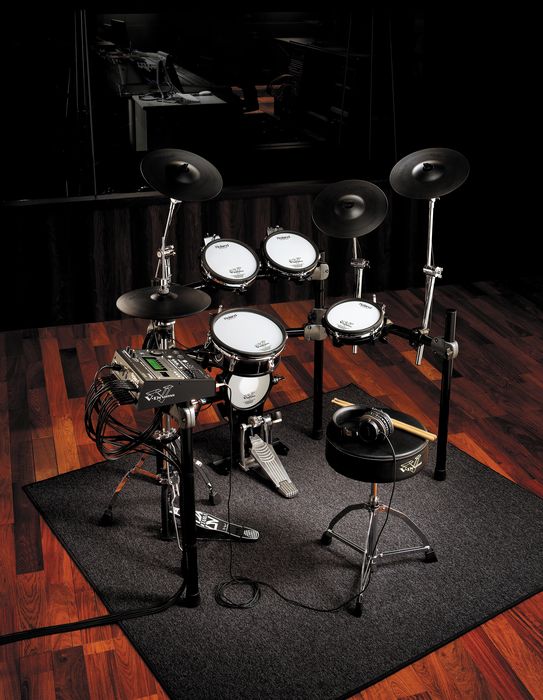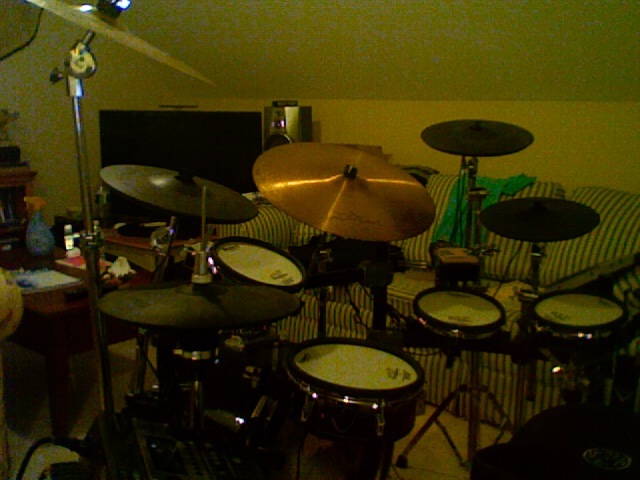3. Philosophy 4. History
THE EQUIPMENT I teach drum set using a hybrid kit composed of the Roland TD-12 Electric Drum Set (pictured right) and an acoustic bass drum and two cymbals. I also often utilize a VicFirth Practice pad. This offers a number of advantages in the lesson setting.
Personally, I strongly endorse Roland electronics, and I believe using this kit in combination with a competent instructor is a very effective way to learn the drums. I pull from a variety of sources to present my knowledge to students including songs, homemade sheet music, drum books, and built in features on the kit. Standard books that I use include Ted Reed's Syncopation (every teacher uses it), Drumset Control, and George Stone's Stick Control. I use portions of a number of other books including Progressive Independance, Brubank's Elemetary Drumming, and other books I've collected over the years or will add to the collection depending on the needs. I try to add as much insight into the lessons as I can. I have never found approaching lessons with a rigid plan to be effective in my experience so I approach lessons with a long term goal in mind, and then attempt to facilitate an evolution of playing topics as the student progresses. I have found that as lessons progress, areas that need attention tend to reveal themselves and we can structure the progress based on those areas. In addition, the student has the freedom to influence the direction of the lessons. In terms of teaching, I mix theoretical with practical. I drum to have fun, but I also think its important to have an understanding on what's going on beneath the surface of the drumhead so to speak. Things like learning how to read music and the way notes are grouped not only help you to learn new music, but also come up with new things on your own by allowing you to quantify in your head what you know and don't know. Also, I can share insights into the physics of how the drum set produces sound and why things are set up the way they are. I really believe in going with the flow, and with drumming that means trying new things and seeing what needs to be addressed. For example, if a student comes in wanting to play a rock beat, and struggles with hitting the bass on two and four, then we say, 'ok, lets practice the bass.' Its really as simple as that. No matter how complicated things get, they can always be broken down and worked out and when it needs to be done. Problems on the drum set always reveal themselves. I also believe in grasping the fundamentals, so with me, you will not only learn how to play the drums, but you will learn to be critical (constructively of course!) of your own playing. Drumming takes skill, finesse, and above all, awareness, and I think these are things that should be apart of learning how to play the drums for fun or more seriously. Lastly, I believe that drumming should be fun! Learning the drums CAN get boring at times, and the journey to proficiency on even one exercise can seem endless. However, given a little time, practice, and patience, a monumental amount of skill can be gained, so I try and think of smalls ways to help make it a little more interesting when it gets dull! I started Paul's Drum Pad in the fall of 2004 as a way to earn money for college before I went off to Boston to the Berklee College of Music. As an avid drummer, I decided to teach drums full time and I quickly gained a total of 15 students. The school was very successful until I made the decision to change the direction of my academic future and attend University for Molecular Biology instead of music. After I decided not to attend Berklee, I closed down the school indefinitely and worked on becoming a better musician and an academic. During this time I have been successful in my studies and have managed to continue playing through a number of small ensembles and University Ensembles. Having gained years more of experience, I have decided to reopen Paul's Drum Pad to share everything I've learned with future aspiring drummers and to get back to one of the things I love doing most: playing the drums. PDP was officially reopened during the summer of 2009 and I have been giving lessons out of my home since then. I am currently taking students so spread the word! |
  |